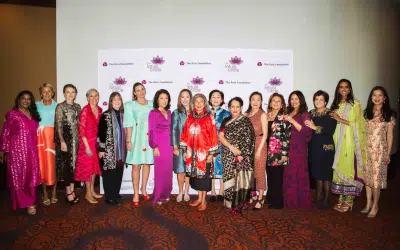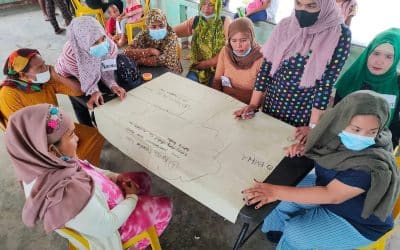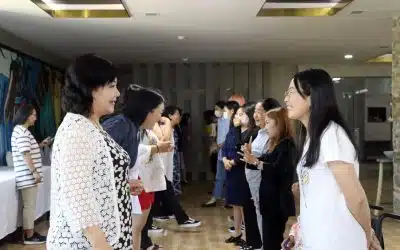InAsia
Insights and Analysis
A Regional Platform for Psychosocial Support in South Asia
August 4, 2021
The three Asian countries of Nepal, Timor-Leste, and Sri Lanka each endured years of civil war and a succession of natural disasters before confronting the Covid-19 pandemic. Leaving little time for recovery, this string of adversities has taken a real toll on many citizens’ mental and social well-being and created a need for comprehensive psychosocial care.

Female community health volunteers are among Nepal’s most important frontline responders (Photo: Transcultural Psychosocial Organization–Nepal).
Each country has responded to its national traumas in its own way, developing policies and programs to help people in distress. The Transcultural Psychosocial Organization Nepal was established in 2005 to help people recover from that nation’s civil war. The Timor-Leste Ministry of Health launched the East Timor National Mental Health Project in 2002 as a primary source of public psychosocial support. And Sri Lanka has trained new cadres to beef up services under its Mental Health Policy of 2005–2015.
Each country has chalked up some significant milestones, but despite their similar, painful histories there has been no international mechanism to share their successes or lessons learned with each other. To bridge this gap, The Asia Foundation last year launched the Covid-19 Regional Exchange 4 Mental Health and Psychosocial Support project (CORE4MHPSS) as a one-year pilot.
How will the project address psychosocial care?
The project goal is simple: to build an online platform where the latest findings about mental health and psychosocial support (MHPSS) can be shared, consolidated, and used to equip first responders and others with basic psychosocial skills (BPS).
First responders are often called upon in the aftermath of disasters to provide comfort and support for people in extreme emotional and psychological distress. Most of us, unexpectedly confronted by a situation like this, would ask ourselves “What should I do? I can’t offer any tangible support,” or “Did I do this right?” The CORE4MHPSS platform focuses on psychosocial skills that most people, regardless of their background or education, can master. For example, it provides practical tips on how to support a person in crisis who is struggling with heightened emotions like anger, confusion, or despair. It also offers strategies and some simple exercises for responders to deal with their own emotional distress.
It has now been nine months since the inception of the project, and a lot has been accomplished. The online platform will offer easy-to-understand video modules that demonstrate basic psychosocial skills that can be applied in times of crisis or humanitarian need. The specific skills were identified by the three participating countries, guided by the BPS Inter-Agency Standing Committee manual, the Good Practice Group/Asia Foundation online BPS course, and supplementary BPS training materials from the Good Practice Group and the WHO.
The videos will be based on real-life situations encountered by frontline workers. Each module tells the same story in each country, but in local languages, and these pilot modules can easily be translated for other countries across Asia. Each video will be followed by answers to common questions and activities to promote reflection on the illustrated skills.

Social workers in Timor-Leste on their way to the shelter to help survivors of the latest floods. (Photo: Zelia Mira Gomes Hornay)
What are some of the lessons learned from the process?
Developing a common online platform for three different countries seemed daunting at first, but the participants brought open minds. The challenge was twofold: to identify a set of fundamental skills that could be applied in widely different situations—an earthquake, a tsunami, or a global pandemic—and to present them in a way that was useful to first responders in all three countries.
The first step was to identify each country’s priority needs, the skills each country needs in its first responders, and the cultural factors that make each national context unique. The commonalities were surprising, and the problem of adapting the platform for each country took a back seat to the bigger picture of shared needs. Regardless of the type of disaster, it was obvious that the consequences were similar: loss of livelihoods, financial stress, gender-based violence, and neglect of the needs of vulnerable people such as those with a disability.
The next step was to develop storylines and scripts for the video modules that would convey key BPS skills. Each country team worked on these stories with the needs of their own country in mind. A central lesson of the process was that these countries had much in common. While adjusting for each country’s specific context was important, it was also important to capture the bigger picture of mental distress and effective psychosocial support.

Psychosocial counselors have played a major role in Sri Lanka during the pandemic, reaching out to vulnerable populations overwhelmed by the hardships of lockdowns. (Photo: Sujeewa De Silva)
How does the project address specific cultural differences?
The lessons presented on the CORE4MHPSS platform must be relevant to all three countries, and each individual user must relate easily to the content. While there was extensive common ground, cultural differences were apparent, and our collective task was to strike a balance between these different perspectives to make the product a fair representation of all three countries.
To guide the discussion, we referred to the BPS Inter-Agency manual, which was compiled from the input of 32 countries and explores in depth the interconnectedness of communities and the struggles we all go through. As we developed the video scenarios, we tried to make sure that the characters did not drift far from the familiar experiences of each country. The settings of the scenarios have been designed to be structurally neutral—a “hospital,” for example, could be represented as a room or a building with white walls and a red cross—and the physical descriptions of the characters are also neutral, an aspect of development that will become even more important as we produce the final videos.
It must be noted that this effort to ensure the “cultural universality” of the learning platform was easier than expected, possibly due to the similar collective spirit of the three cultures as well as the flexibility and the understanding of everyone involved. The project has also set a strong precedent for similar collaborations among Asia Foundation offices in the future, particularly when dealing with fundamental common problems. The MHPSS platform is expected to be fully operational in September 2021.
Iris Trapman is a consultant for The Asia Foundation in Timor-Leste, Rehan Meemaduma is an MHPSS program assistant for The Asia Foundation in Sri Lanka, and Tsering Kenji is a consultant for The Asia Foundation in Nepal. They can be reached at [email protected], [email protected], and [email protected], respectively. The views and opinions expressed here are those of the authors, not those of The Asia Foundation.
About our blog, InAsia
InAsia is posted and distributed every other Wednesday evening, Pacific Time. If you have any questions, please send an email to [email protected].
Contact
For questions about InAsia, or for our cross-post and re-use policy, please send an email to [email protected].The Asia Foundation
465 California St., 9th Floor
San Francisco, CA 94104
The Latest Across Asia
News
April 25, 2024
Program Snapshot
April 18, 2024
News
April 17, 2024

2024 Lotus Leadership Awards
The Lotus Leadership Awards recognize contributions towards gender equality in Asia and the Pacific







0 Comments